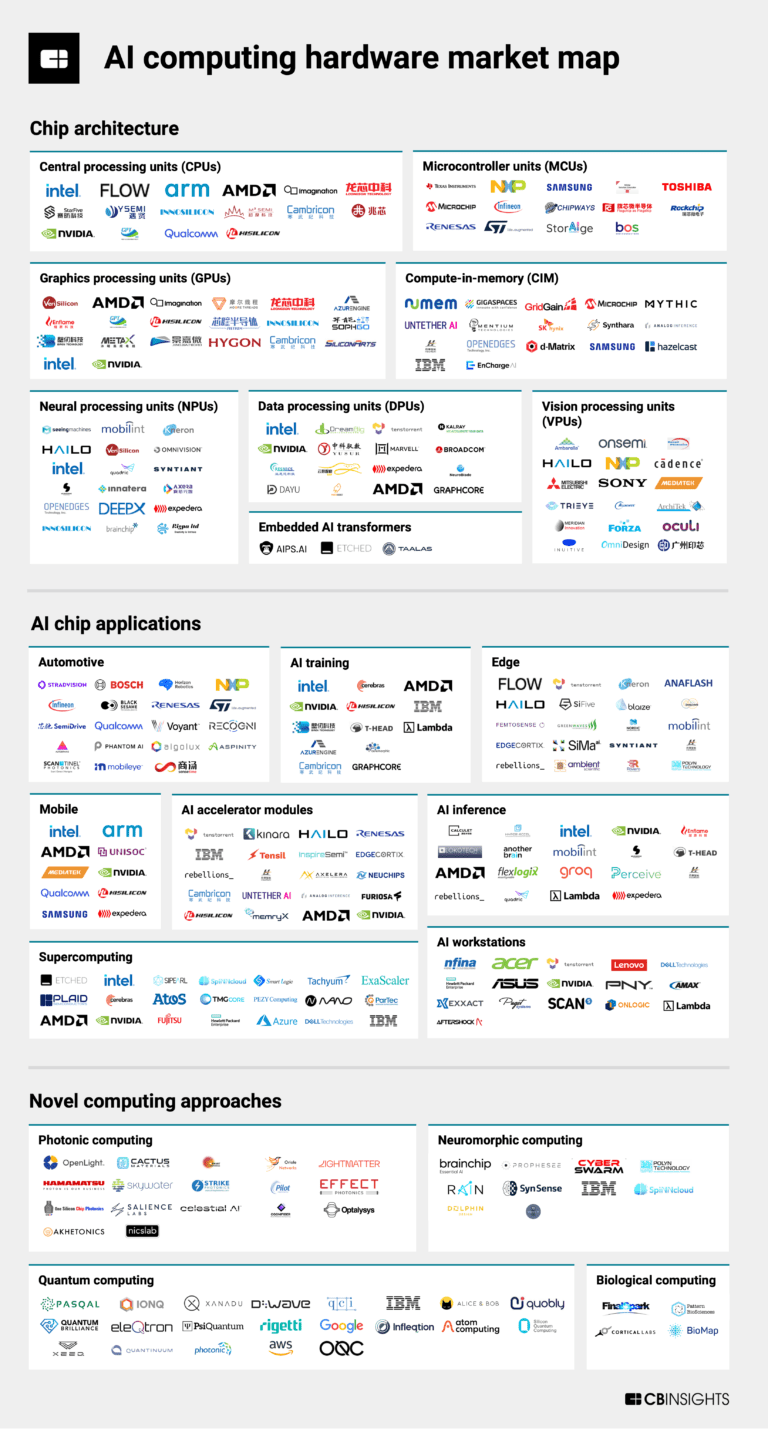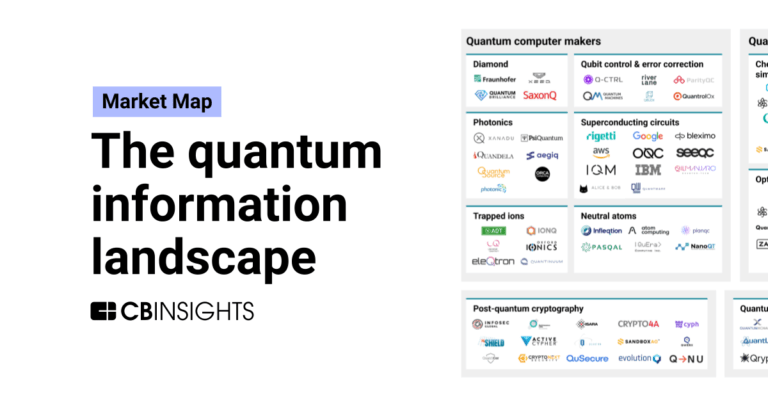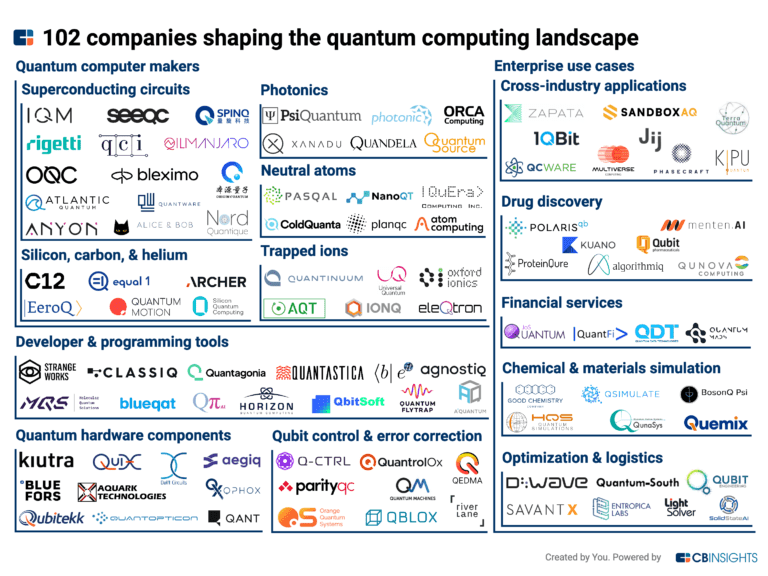
PsiQuantum
Founded Year
2015Stage
Series E - II | AliveTotal Raised
$2.128BLast Raised
$22M | 1 mo agoMosaic Score The Mosaic Score is an algorithm that measures the overall financial health and market potential of private companies.
+28 points in the past 30 days
About PsiQuantum
PsiQuantum focuses on developing quantum computers. Its main offerings include the design and construction of utility-scale quantum computers utilizing a photonics-based architecture. The company also engages in research and development of applications for quantum computing that address problems in various sectors. It was founded in 2015 and is based in Palo Alto, California.
Loading...
ESPs containing PsiQuantum
The ESP matrix leverages data and analyst insight to identify and rank leading companies in a given technology landscape.
The quantum computer makers — photonics market refers to companies that build quantum processors using quantum properties of light for quantum information processing. These providers develop full-stack photonic quantum computing systems that include hardware, software interfaces, and networking components. Their approaches offer advantages in scalability, room-temperature operation, and interconne…
PsiQuantum named as Leader among 10 other companies, including Xanadu, Photonic, and ORCA Computing.
Loading...
Research containing PsiQuantum
Get data-driven expert analysis from the CB Insights Intelligence Unit.
CB Insights Intelligence Analysts have mentioned PsiQuantum in 4 CB Insights research briefs, most recently on Sep 13, 2024.

Sep 13, 2024
The AI computing hardware market mapExpert Collections containing PsiQuantum
Expert Collections are analyst-curated lists that highlight the companies you need to know in the most important technology spaces.
PsiQuantum is included in 3 Expert Collections, including Quantum Tech.
Quantum Tech
617 items
This Expert Collection contains private and recently exited companies working on quantum computing, quantum communication, post-quantum cryptography, quantum sensors, and other quantum tech.
Unicorns- Billion Dollar Startups
1,276 items
Semiconductors, Chips, and Advanced Electronics
7,380 items
Companies in the semiconductors & HPC space, including integrated device manufacturers (IDMs), fabless firms, semiconductor production equipment manufacturers, electronic design automation (EDA), advanced semiconductor material companies, and more
PsiQuantum Patents
PsiQuantum has filed 234 patents.
The 3 most popular patent topics include:
- quantum information science
- photonics
- optical devices

Application Date | Grant Date | Title | Related Topics | Status |
|---|---|---|---|---|
2/10/2023 | 4/8/2025 | Quantum information science, Quantum mechanics, Quantum computing, Quantum measurement, Theoretical computer science | Grant |
Application Date | 2/10/2023 |
|---|---|
Grant Date | 4/8/2025 |
Title | |
Related Topics | Quantum information science, Quantum mechanics, Quantum computing, Quantum measurement, Theoretical computer science |
Status | Grant |
Latest PsiQuantum News
Jul 3, 2025
by thomascher... July 3rd, 2025 Too Long; Didn't Read Jensen Huang was pessimistic about quantum computing in January 2025. He reversed his entire stance in March and spoke extremely positively in June about quantum technology. I cover and explain the full story. People Mentioned And Backed The Statement With Several 100M+ USD Investments Into Quantum Computing Infrastructure and Startups This happened in March 2025, but I did not see anyone on this platform covering it. Late as it may be, this should be covered! Nvidia CEO Jensen Huang was a public face of quantum skepticism. He consistently framed practical quantum computing as a distant reality, suggesting it could be 15 to 30 years away. In classic Zuck style, Mark Zuckerberg echoed his sentiments, while admitting that he was not an expert on the matter (lol). These cautious views, voiced as recently as early 2025, had a tangible impact, causing significant drops in the market value of publicly traded quantum companies. Huang’s rationale was rooted in scale, arguing that the technology needed a million-fold improvement to become truly useful. I wrote an article about it: And I received validation on my views, but neglected to write about it. Oh well - better late than never! The Dramatic Pivot Huang admitted he was wrong about the quantum computing timeline. The turnaround is not just a simple admission of being wrong, but a sophisticated pivot. On June 11th, 2025, he even said that quantum computing is approaching an “inflection point.” Nvidia and its CEO embraced the near-term reality that the future of high-performance computing is not purely quantum: But a hybrid model where classical and quantum processors work in tandem. This realization has shifted the company's strategy from "wait and see" to actively building and enabling this hybrid future. And - the Blackwell GB200 is leading the hybrid race! The Secret Moat - CUDA-Q The cornerstone of Huang’s new strategy is the CUDA-Q software platform. Recognizing the immense success of its CUDA platform in creating a developer moat around its GPUs for AI, Nvidia is replicating the playbook. CUDA-Q is designed to be the essential software bridge that allows the millions of developers in Nvidia's ecosystem to seamlessly: Integrate quantum processing units (QPUs) into their existing classical computing workflows. Crucially, CUDA-Q is hardware-agnostic. It supports QPUs from a diverse range of partners, including leaders like Quantinuum, QuEra Computing, and Quantum Machines. This brilliant move positions Nvidia as the indispensable software layer for the entire emerging industry. It ensures its relevance and profitability regardless of which specific quantum hardware technology ultimately wins the race! This. Is. Genius. Massive Investments in Quantum Technology Development To accelerate the hardware-software integration, Nvidia launched the Nvidia Accelerated Quantum Research Center (NVAQC) in Boston. This is a dedicated, high-profile initiative aimed at pairing its most advanced AI supercomputers, like the GB200 NVL72 systems, with cutting-edge quantum hardware. The center fosters deep collaboration with academic powerhouses like Harvard and MIT, as well as its commercial quantum partners. The explicit goal of the NVAQC is to use the power of classical AI to solve some of the most difficult challenges in quantum computing. This includes developing more efficient algorithms and, most importantly, tackling the critical problem of quantum error correction. This creates a powerful symbiotic relationship: Nvidia's AI helps make quantum computers better, and those improved quantum computers will, in turn, accelerate AI. And perhaps the most definitive signal of Nvidia's new quantum ambition is its direct investment in hardware. The Choice of the Startup: PsiQuantum In a landmark move, the company entered advanced talks to take a significant stake in PsiQuantum. PsiQuantum is a startup pursuing a challenging but potentially revolutionary photonic approach to quantum computing. This is Nvidia's first major direct investment in a quantum hardware company, a tangible financial commitment to hastening the arrival of fault-tolerant systems. The choice of PsiQuantum is telling. The startup has one of the most ambitious goals in the industry: to build a million-qubit, fault-tolerant computer before the end of the decade. By backing this effort, Nvidia is not just hedging its bets. It is actively investing in a potential quantum leap, moving beyond simulation and software to directly funding the physical construction of next-generation machines. The GB200 is Accelerating Quantum Computing Research NVIDIA's GB200 Grace Blackwell Superchip represents a game-changer in the classical simulation of quantum systems. It provides researchers with a powerful platform to model quantum computers at an unprecedented scale. This capability is critical for the current NISQ (Noisy Intermediate-Scale Quantum) era. It allows for the rigorous testing and debugging of complex quantum algorithms and error-correction codes long before fault-tolerant hardware becomes available. The massive, unified memory pool of the GB200 is particularly advantageous for quantum simulation, as the state vector of an n-qubit system requires 2^n complex values. This architecture mitigates the memory bottlenecks that typically constrain high-qubit simulations on distributed systems. Researchers can now simulate ideal, noise-free quantum circuits with a higher number of qubits than previously feasible. They are establishing clean performance baselines for algorithms destined for future fault-tolerant machines. The U-Turn in Nvidia’s Stance This strategic activity has also been matched by a complete change in Jensen Huang's public views. His tone has shifted from long-term caution to near-term excitement. At recent company events, he has declared that quantum computing is nearing an "inflection point" and that the community is "within reach" of solving meaningful problems. This new narrative, coming from one of tech's most influential leaders, has injected fresh optimism and validation into the entire quantum sector. And with CUDA-Q, he has created a moat around QPUs, even before they are commercially viable. As I said, this is genius. A truly masterful stroke by Nvidia, hoping to repeat their GPU success with QPUs. The Quantum Conclusion While still acknowledging the long road to a standalone quantum computer: Huang has expertly positioned his company to dominate the lucrative and more immediate hybrid quantum-classical market. By building the: Strategic hardware investment (PsiQuantum)
PsiQuantum Frequently Asked Questions (FAQ)
When was PsiQuantum founded?
PsiQuantum was founded in 2015.
Where is PsiQuantum's headquarters?
PsiQuantum's headquarters is located at 700 Hansen Way, Palo Alto.
What is PsiQuantum's latest funding round?
PsiQuantum's latest funding round is Series E - II.
How much did PsiQuantum raise?
PsiQuantum raised a total of $2.128B.
Who are the investors of PsiQuantum?
Investors of PsiQuantum include Redpoint Ventures, Playground Global, Atomico, M12, Temasek and 24 more.
Who are PsiQuantum's competitors?
Competitors of PsiQuantum include Infleqtion, Xanadu, Nord Quantique, Photonic, Akhetonics and 7 more.
Loading...
Compare PsiQuantum to Competitors

Xanadu provides a quantum photonic platform. Its platform uses artificial intelligence to integrate quantum silicon photonic chips into existing hardware to build a full-stack quantum computer. It enables clients to receive a quantum technology-based computing facility using a photonic cluster state technology and easily solve business problems. The company was founded in 2016 and is based in Toronto, Canada.
Polaris Electro-Optics focuses on integrated photonics for the communications and computation sectors. The company provides photonics products for data transmission in applications including data centers, cloud computing, artificial intelligence, high-performance computing, and quantum computing. It was founded in 2021 and is based in Broomfield, Colorado.

Oxford Quantum Circuits focuses on providing enterprise-ready quantum computing solutions in various sectors including financial services, automotive, energy, health, and national security. The company offers accessible, secure, and reliable quantum capabilities through cloud services and direct quantum computing as a service (QCaaS), designed to integrate seamlessly with existing applications and workflows. Oxford Quantum Circuits primarily serves industries that require advanced computational power to tackle complex challenges. It was founded in 2017 and is based in Reading, United Kingdom.

Alice & Bob is a company involved in developing universal quantum computers within the technology sector. Its offerings include designing qubits with built-in error correction for quantum computing. It also provides consulting services to aid businesses in recognizing quantum advantage opportunities and a platform for testing quantum hardware remotely. It was founded in 2020 and is based in Paris, France.

Alpine Quantum Technologies (AQT) specializes in general-purpose quantum computing within the quantum information processing industry. The company offers products and services based on trapped-ion technology, designed to perform a wide range of tasks such as molecule simulation and process optimization in various industries. AQT's quantum solutions are applicable in sectors such as chemistry, material sciences, and manufacturing. It was founded in 2018 and is based in Innsbruck, Austria.

Q.ANT specializes in industrial quantum technology and photonics solutions in native computing and sensing. The company offers products for artificial intelligence processing through photonic computing and provides sensing capabilities for applications. Q.ANT's technology aims to improve energy efficiency in data centers and enable human-machine interfaces. It was founded in 2018 and is based in Stuttgart, Germany.
Loading...


